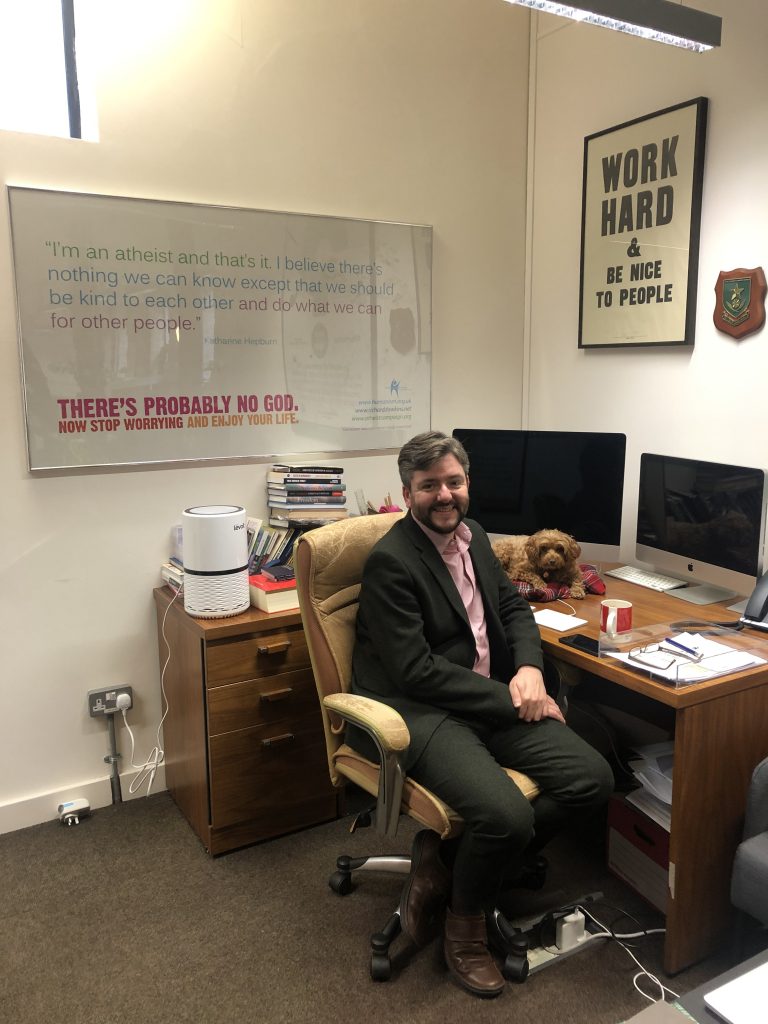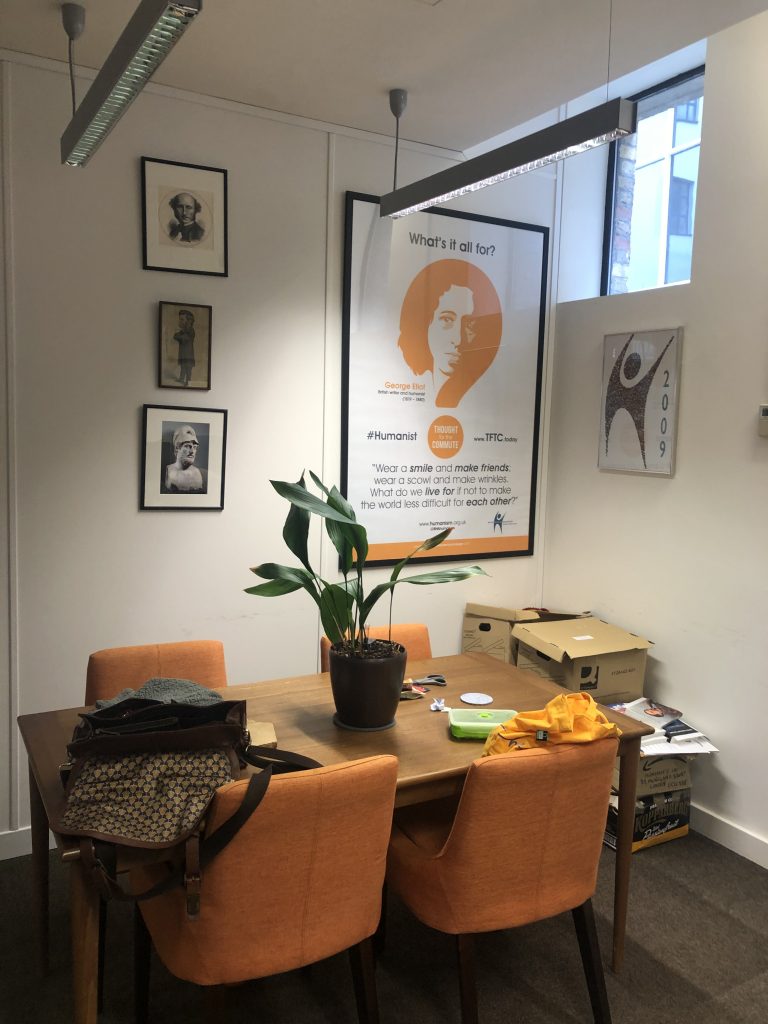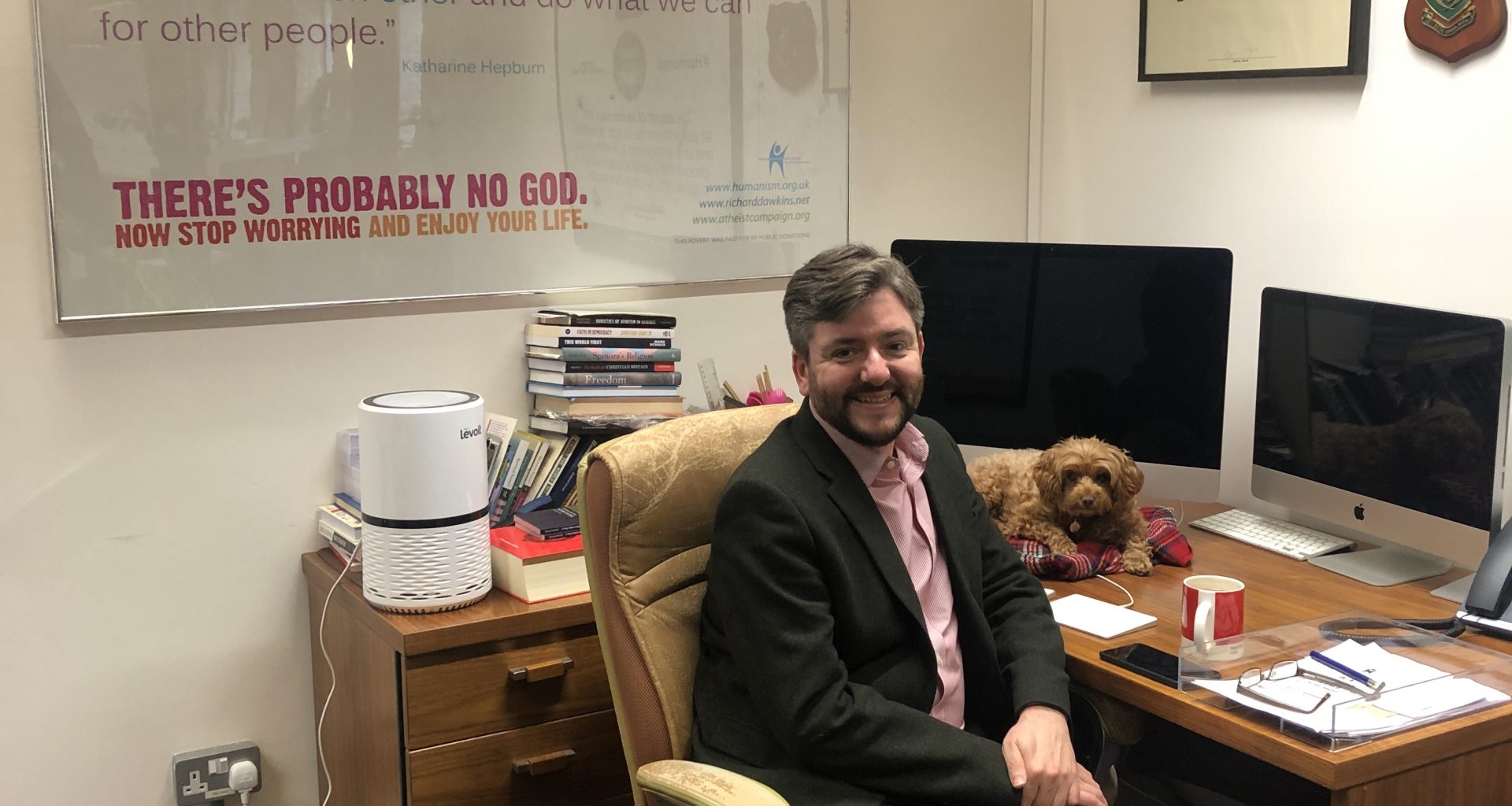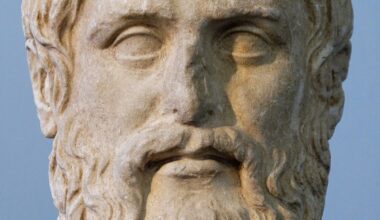Continuing with this month’s theme of humanism, the following is an interview with Andrew Copson, Chief Executive of Humanists UK and President of Humanists International.
I met Copson in his office in the Humanists UK headquarters, in the basement of 39 Moreland Street, Islington. His dog, Juno, lay quietly on his desk in her tartan blanket until she was picked up by his husband. The feet of occasional passers-by could be glimpsed through the windows. A poster hung above the desk with the motto ‘WORK HARD & BE NICE TO PEOPLE’.
Copson read Ancient and Modern History at Balliol College, Oxford. He graduated in 2004 and started working for the British Humanist Association in 2005, becoming its Chief Executive in 2010 at the age of 29. The organisation changed its name to Humanists UK in 2017.
Over the last decade, Copson has become one of the leading advocates for modern humanism. His published books include Secularism: A Very Short Introduction; The Little Book of Humanism (with Alice Roberts); and The Wiley Blackwell Handbook of Humanism (co-edited with A.C. Grayling), to which he contributed a chapter on ‘What is humanism?’
In this interview, we discuss the origins and various meanings of humanism, its relationship to policy-making in Humanists UK, and whether it is legitimate to label all sorts of thinkers ‘humanist’ in a modern sense even though they lived before the nineteenth century.
The conversation also touches on the culture wars, Brexit, the pandemic, and the scientific method, as well as why, from a humanist perspective, free thought and free speech are inextricably linked – and what limits there should be to the latter. Finally, Copson reminisces about the ‘atheist bus’ movement, and reveals the books he turns to for humanist inspiration.

Freethinker: There are different things which different people mean by humanism. We may think of Renaissance humanism, or humanism in the classical world. But what is the idea of humanism represented by Humanists UK?
Andrew Copson: You’re right that, just like secularism, there are multiple and contested definitions of humanism that have operated at different periods in the past, and also different definitions that operate in different parts of the world. Ever since Humanists UK has been an organisation, including its predecessor organisations, the ‘humanism’ that they have meant is that attitude that combines a naturalistic approach to the universe with a human centred approach to morality and questions of meaning and purpose.
So people like Harold Blackham at the start of the BHA, Margaret Knight, Hector Hawton, who kickstarted the organisation in the mid 20th century, were happy to talk about the humanism of the ancient Mediterranean world, the humanism of classical China, or the humanism of ancient India and the humanism of the modern West as the same type of thing. And that non-culturally specific range of attitudes and values that has appeared perennially in different human cultures at different times is the sort of humanism that Humanists UK are talking about.
Freethinker: So a human-centred morality and non-religious attitudes?
Copson: Yes. It’s very difficult to put into a potted definition, because there are long books of many volumes that are written about what humanism is, but, in brief, that’s the humanism that Humanists UK– and in fact, international humanists or humanist organisations around the world – use. The other uses of the word are not so common, especially in languages other than English. The word ‘humanism’ is sometimes glossed as being like humanitarianism. And then there’s the use of humanism to refer to a particular historical scholarly movement, like Renaissance humanism, that rediscovery of pre-Christian literature and ideas in Europe. And then, in US English, humanism sometimes refers to the modern discipline of the study of the humanities. But humanism for us is that non-religious worldview.
Freethinker: How would you distinguish humanism from atheism, scepticism, freethought, and so on?
Copson: I would say they’re all different things, doing a different job. Atheism is a lack of belief in god, it’s a specific word to describe a specific attitude on one particular question. Scepticism is a wider intellectual attitude. It’s a certain approach to knowledge, how you find things out and how you react to other people’s truth claims. That sceptical approach is part and parcel of the humanist view. ‘Freethought’ feels to me a historically specific thing. I think of freethinking as being a nineteenth-century phenomenon – a very nineteenth-century word.
Freethinker: To what extent does your idea of humanism involve positive values? I mean definable values more than just the attitude that you have been talking about.
Copson: I think that humanism is an approach, an attitude, a framework for making sense of things and understanding your own place and the place of people generally in the universe and in our own societies. I would never say that it had prescribed content. So if by positive values you mean some sort of manifesto or platform – certainly humanist organisations have manifestos, platforms and agendas where they try to apply humanist values and approaches in their own specific contexts and in the domains we operate, whether it’s the political sphere, the provision of community services, social movements and so on. But I wouldn’t say that humanism itself had, as it were, eleven pillars of humanism, or ten rules in that sense.
But it is a positive attitude. If you want to say that it’s not a negation of something in the way that atheism is a negation of the idea that there should be gods – atheism is quite a Christian concept – to the extent that it’s not about negating things, the humanist approach to life is positive. It’s saying we accept the evidence that we can see around human origins, the nature of the universe and everything else. The humanist approach is affirmative in terms of human choice and freedom, and in our responsibilities to each other and in the attaching of value to human lives and to our own experiences. And it’s positive in the sense that a humanist approach to life and to other people is affirmative of them, not just of humanity generally and of one’s own freedom of choice, but of others. For a given value of positive, I would say that a humanist approach is positive, proactive and affirmative. And that’s not just a way of saying I like it and it’s a good approach to life – I think there is something inherently positive about it.
Freethinker: Looking at your Little Book of Humanism and other humanist materials, it seems that you do want to develop quite a specific approach to morality, which is this human-centred approach. Would it be fair to say that concerns with human-based morality have been part of humanism since 1896 at least?
Copson: I use the word ‘humanism’ as the people who started humanist organisations did, to describe a certain approach to life that does exist, and existed before the word ‘humanism’ was coined. The people I talked about a moment ago as being amongst the founders of the modern humanist movement in the mid-twentieth century, they didn’t think they were making this stuff up. They thought that they were discerning a real tradition of thought that has existed in different societies and different places in disconnected ways, but that was increasingly widely held in their own time. They tried to give form and to describe the content of this attitude, but they didn’t think they were inventing it.
They weren’t like American humanists who would write a humanist manifesto and claim to have invented humanism. The founders of British humanist organisations were more likely and are still more likely to claim that humanism is a pre-existing thing, and the word ‘humanism’ a post-hoc coinage to describe something that already exists – a perennial philosophy that pops up now and again. So we’re not trying to develop a certain content for humanism, or that it was a belief-based organisation which needed to flesh out its policies. But I would agree with the characterisation of a humanist approach as being human-centred in this way. Once you start thinking in that way, some things follow from it. The things we talk about in The Little Book of Humanism are just the outworkings of that attitude.
Freethinker: Hence why you can justify calling all sorts of people who lived in so many centuries before the nineteenth century ‘humanists’.
Copson: Yes. It’s an almost sociological, descriptive use of the word, just as you might argue that Spartacus was a socialist. Today, everyone is obsessed with identity, and there’s an allergic reaction to the idea that you might apply an adjective to someone if they didn’t apply it to themselves. But I think that is a basic misunderstanding of language.
Freethinker: Is there a risk that calling all these people humanists in the ‘attitude’ sense might be confused with calling them humanists in the sense of sharing the values, campaign aims and policies of an organisation like Humanists UK?
Copson: I don’t think so. Not every humanist would agree, for example, with all the policies of Humanists UK.
Freethinker: You could argue that anyone who thinks that morality starts with human beings and has a non-religious world view would count as humanist. How is it that Humanists UK can justify labelling any particular policy as ‘humanist’, if this is such a general term?
Copson:Today we organise ourselves under the broad platform of freedom of thought, expression, choice. The idea being that it is a distinctively humanist idea that the individual human being has one life, and that if human development, flourishing and happiness is going to occur, it can only occur then. This idea of human flourishing, which is based on distinctively humanist foundations, dictates the sort of policies that Humanists UK promotes – for example, legal protections for freedom from discrimination; reform of school curriculums and school structures so that they better promote freedom of thought; and removing obstacles to individual freedom of choice, whether it’s outmoded law, religious strictures, social conformity, the government’s poking of its nose into things, prejudice or discrimination, or the way that your circumstances might limit your freedom of choices in life.
So that’s the way policy is developed by Humanists UK. And then we apply those principles to the political, social and legal environment, and see where the barriers are to the realisation of those human development aims.
Freethinker: To what extent would you characterise Humanists UK as a political organisation?
Copson: Humanists UK is many types of things. It’s a community service provider, a movement for social change, and an organisation that seeks to elucidate particular values to people. But it is also a platform for political change, as well as legal and social change.
Freethinker: Where would you describe Humanists UK on the political spectrum, in terms of the political philosophies or the political change you’re advocating?
Copson: I think it’s ‘humanist’. I think there’s an obvious sympathy between humanist political positions and liberal ones. When Bertrand Russell was talking about discerning humanism, as it were, through the ages, he almost made it inherent in the humanist position. So he was talking about the reliance on science, a certain attitude towards moral judgement and towards questions of meaning and purpose in life, and a certain liberal political attitude.
I think that’s probably right. If you think that human development has an importance in the mortal context that we’ve just been talking about, then you’d probably best pin a humanist approach today, at least in Britain, to a liberal approach. In the twentieth century in particular, some humanists have been very strong advocates of socialism – meaning different things by that.
Freethinker: And some who weren’t.
Copson: Exactly. So I think liberals and socialists probably have a good claim to be humanistically inspired. But then if I think of political Conservatives that I know who are members of Humanists UK or members of the Parliamentary Humanist Group, they also mount a human development, human freedom-based argument for their political principles. So I think they would typically say something like, it’s more likely that more people will be happier and have more freedom if we give greater protections to personal property, greater incentives for self-improvement. A socialist humanist might say, well, it’s far more likely that more people are going to have greater freedom of choice and dignity in their lives if we make more standardised provision for everybody.
Freethinker: But Humanists UK wouldn’t come down on the side of a particular political party?
Copson: No. It would be unlawful.
Freethinker: Because you’re a charity.
Copson: Yes. But even if we weren’t a charity, I don’t think that would happen, because there are humanist groups in all the political parties: there’s the Conservative Humanists, the Labour Humanists, the Humanist and Secularist Liberal Democrats, the Green Party Humanists.
Freethinker: Is there a UKIP Humanist group?
Copson: No. Is there a UKIP? When the Brexit referendum happened, we commissioned six blogs on our website, three by humanist Remainers and three by humanist Brexiters.
Freethinker: So it can cut across those sorts of divides.
Copson: Definitely. I think what a humanist attitude is incompatible with is a small ‘c’ conservatism. To be hidebound, to put a value on tradition that is weighed in itself against other values and priorities, is probably incompatible with the idea that we should think from first principles about things, be free, be self determined, try to maximise human development.
Thinkers who have opposed humanism, like Roger Scruton or Edmund Burke, these are the sort of people who have said, we don’t want individuals to be rational actors, we don’t want the state to be a social contract – we want something more ethnic, more organic, more rooted in timeless things that you can’t question.
Freethinker: You’re not saying that tradition is automatically bad?
Copson: No. But the attitude that put it above everything else dogmatically as a point of principle would be bad.
Freethinker: But the aim you have in mind is human flourishing – individually and –
Copson: And en masse.
Freethinker: Presumably there will be times when individual human flourishing and the flourishing of society more generally are in conflict. How does humanism deal with that?
Copson: The moral principle that a human has recourse to then, which has become quite deeply encoded in human rights law, is the John Stuart Mill idea that your rights or entitlement to the maximum possible flourishing you can have, should be limited only by the rights of others. That’s a pretty good tool. I’ve never, in my 15 years here, seen a political discussion, a conflict of rights, a clash of individual or social aims or group versus group that couldn’t be resolved by that sort of mechanism. Doesn’t mean the answer is obvious.
Freethinker: And you want to argue that you need to look not just at ‘freedom of religion’, but ‘freedom of religion or belief’.
Copson: Absolutely. I think we’d far rather talk about ‘freedom of thought and conscience’.
Freethinker: You said before that humanism was more of an attitude. Perhaps it doesn’t easily fit into the idea of ‘belief’?
Copson: No. With the definition of ‘belief’ as it is now in human rights case law, it does fit. But that’s not because of anything obvious about the word itself, or the normal usage of the word.
In French, the translation is convictions, and in German, Weltanschauung, ‘worldview’, – both of which are much clearer. In English, they inexplicably put ‘religion or belief’, where ‘belief’ has a common usage which has all sorts of meanings. But ‘belief’ as a term in equality law and human rights law, as legislators have intended it to be defined, and as case law has continued to define it, is a humanist attitude. And the ideas of humanists fit into that very clearly. But you wouldn’t use that word if you were having a commonsense conversation.
A lot of humanists react poorly to the idea that a lot of the things they think could be described as beliefs. If you think that human beings are the product of natural processes like evolution, you would not want to say it was a belief, but accepting the evidence. If I was writing it down, I would say that I accept that human beings are the product of natural processes. I do not believe it in some sort of convictional way. I just accept it because I can see the evidence for it.
Freethinker: Would that also entail a certain amount of reservation, just in case you might be wrong?
Copson: Exactly. I accept that evidence for now, with the implication that that is the current view, that is where the evidence currently is. I don’t know if I really have any ‘beliefs’.
Freethinker: But you’ve done a whole podcast series on ‘What I Believe’.
Copson: Yes, but that’s a historical reference back to essays by Bertrand Russell and E.M. Forster.
Freethinker: How did the rise of the humanist movement in Britain relate to humanism in other countries?
Copson: When we think about our movement, like all history, it is difficult to mark the clear points. Do you want to tie our history into the history of the man who goes up in front of the magistrate in the seventeenth century, because when he was drunk in the tavern he said he did not believe all this nonsense anyway and why did the priests have so much power?
Freethinker: Let’s take 1896 as a starting point.
Copson: 1896 is probably the least important. Organisationally that’s when we began. We were founded as the Union of Ethical Societies, which had a slightly different ethos from humanist organisations today. But the word ‘ethical’ in ‘Ethical Union’ does not refer solely to morals – it was almost like the way we use ‘humanist’ today. It describes both the intellectual approach to things and a set of values.
Freethinker: If freedom of thought and freedom of speech are two sides of the same coin –
Copson:They are inextricably linked.
Freethinker: And absolutely essential to a humanist or non-religious worldview –
Copson: Yes.
Freethinker: Does Humanists UK find itself taking a position in the culture wars, or do you try to stay above them? Let’s say all the topics that are controversial at the moment: transgender theory, definitions of race, Brexit, the pandemic, religious freedom, how far one should criticise Islam, pulling down statues…
Copson: I don’t think we do. There are about 47 policy areas within our policy remit, but we have six campaigns at any one time. At the moment, they are assisted dying, humanist marriages, the RE curriculum across the UK, the blasphemy law in Northern Ireland, collective worship across the UK, and working to get the UK government to be more active on behalf of humanists persecuted abroad. We select these campaigns because they are the areas we judge to be of high social importance, or where other people are actively arguing against the position that we would promote, or where we think success might be more achievable in the shorter term – but they are all focused on achieving specific legislative changes.
So, for example, when we are asked questions like, do we have a view on what a woman is – we don’t. We have a long-standing view on the need for people who are undergoing gender reassignment to have equal treatment and for the human rights of trans people to be respected and upheld. That’s a specific legal, political, human rights question. But then on the wider question of what’s a woman, what’s a man, it is not the sort of thing on which an organisation would take a view. The important thing for us is that people should always discuss these things and be open-minded, and there should be a space for freedom of thought and freedom of expression on these issues.
Freethinker: So you would say that Richard Dawkins, for example, is entirely entitled to discuss gender issues in whatever way he wishes.
Copson: I would hope he would do so in a way that respected other people’s dignity and everything else. We have got certain values as an organisation, which we we could expect our own people, our own staff, to abide by. You would not expect everyone to abide by this, but I would hope everyone wanted to treat other people with respect, listen to different opinions, express themselves in a way that did not undermine other people’s dignity or rights or threaten them in any way.
Freethinker: What about satire? Is there still a space for that in the humanist worldview?
Copson:Yes. A lot of our patrons are satirical comedians.
Freethinker: Where do you draw the line between legitimate satire and not respecting people’s dignity?
Copson: This is one of those questions that cannot be answered in the abstract. I do not think that the causing of offence is a harm. I feel quite strongly about that. Some of the problems that people get into today are because they say, ‘if I’m offended, I’m harmed,’ and that because it is right to limit other people’s freedom in order to avoid harming others, this is an example of where their freedom should be limited.
That is wrong, because offence is not a harm – it can be a great benefit. I have been offended in the past and as a result, changed my mind about things on reflection. Martin Rowson, the Guardian cartoonist, is highly offensive in a lot of his material. He gave a talk at the 2014 World Humanist Congress called ‘Giving the Gift of Offence’, where he made an argument based on anthropology, sociology and history, to say that one of the most important things you can do is to offend people.
If you’re offended, agitated in your opinions, vexed about something in your mind, that can stir thought, change, and all sorts of positive developments. I think, for example, about the cases involving the cartoons of Mohammed, for example in the Batley case, I would have probably said that offence actually has educational value. It stimulates thought.

Freethinker: So cartoons like that or blasphemous cartoons should be capable of being taught in school?
Copson: Absolutely. I went on the Sunday programme and said that. I had an interesting discussion with a Muslim teacher at the time – we sort of agreed.
To come back to your question, where does the dignity of a person begin, that is a genuinely difficult question, because it is contextual. We can all understand that if you are shouting abuse into someone’s face, you are violating their rights, their dignity. That is why we have a concept of harassment in the law – you are harming them, threatening them, intimidating them, they feel that way and you have crossed the line. If you imagine pulling that person back from that other person’s face further and further, how far do they need to go before it is not violating the dignity of the person they are targeting? There is a good case for saying that any targeted criticism of that sort could begin to meet a definition of being a violation of person’s dignity. It would depend what they were saying, how they were saying it, and who was saying it.
Freethinker: What about individuals versus groups? You might accept that targeted hatred or harassment against particular named individuals would cross the line. But what about specific groups? What about if you were criticising Christians or Muslims in general?
Copson: It depends on the context. Are you asking what sort of things should we morally disapprove of, or what sort of things should be legally sanctioned? I think there’s a high bar for legal sanctions because you want to maintain the maximum space for the exchange of views and individual agency.
The Rabat Plan of Action [on the prohibition of advocacy of national, racial or religious hatred that constitutes incitement to discrimination, hostility or violence] is good in relation to hate speech because it lays out a series of principles which you might apply to find out whether or not you have reached a threshold to be treated as the incitement of hatred.
I do think that there is scope for laws that criminalise the incitement of hatred, not just the incitement to violence, because I think it is better than allowing hatred to be incited that makes large groups of people’s lives difficult, precarious, vulnerable or limited in some way. It is prudent to cut off hatred before it turns into violence and persecution, but with a very high bar. Intention has got to be an important part of it, the vulnerability of the group or class that you are stirring up hatred against.
I would not say that landlords should be treated in the same way as gay people in concepts about incitement of hatred. If you are having a demonstration to say that there should not be any landlords because they are ruining the economy, obviously that is different from saying there should not be any gay people.
Freethinker: But look at what happened to landlords in communist Russia and China.
Copson: Again, that’s why context is important. That’s a long way from happening here. Were it to be a possibility, then I might easily be persuaded that you would have to protect that class of people in some way.
Freethinker: Moving onto a topic which is related to free speech in different ways: science. Scienceor the scientific attitude seems to be an important part of modern humanism. Do you agree?
Copson: Yes. A lot of scientists came into the humanist movement in the mid-twentieth century. There were some early on, but not quite as many. In the twentieth century, the sort of people who came in who in the nineteenth century might have more naturally fitted into the Rationalist Association. For example, the scientist T.H. Huxley was a rationalist in the nineteenth century, and his grandson, Julian Huxley, was the first President of the British Humanist Association. Francis Crick was another; Jacob Bronowski was the most famous one because he was so involved – he was not just a scientist, he was a patron and activist for humanist organisations.
Freethinker: If we think around the turn of the millennium, we have the New Atheism movement, in which Richard Dawkins, A.C. Grayling and Christopher Hitchens were the ‘big three’. Richard Dawkins has arguably made a big impact on the status of science in humanism – would you agree?
Copson: Arguably, the humanism that we have had since the twentieth century has been the ethical people plus the rationalists. Although the Rationalist Association exists as a separate organisation, there was a huge influx of everyone into the British Humanist Association. Humanism was seen as a coming together of the ethics on the one hand and the ‘rational’, scientific people on the other. Throughout the twentieth century that has been the keynote.
What might have been new by the end of the 20th century was that more biologists were involved. And that was because of the totemic importance that human origins had assumed in the wider humanist movement – both because it is an important part of being self-aware to know where our species has come from, what we are not and what we are, but also because there was an increasing contrast with the biblical literalism of some of the bigger religious groups at the time, not just Biblical literalism, but Quranic literalism, any sort of scriptural creationism.
The great stimulus to growth in the beginning of the twenty-first century for humanist organisations, both here and elsewhere in the world, was the threat of creationism in schools, creationism as a phenomenon being exported from Turkey or America. So probably scientists and biological scientists in particular assumed a greater importance within the things we would talk about.
Freethinker: How important is the scientific method to humanism?
Copson: It has always been very important. For example, Harold Blackham, when he talked about reason and experience, was really talking about the scientific method that applies to everything.
Freethinker: When we talk about the scientific method, are we talking about something like verification or falsification or trying to get the best possible understanding through empirical evidence?
Copson: Yes. The important concepts are observation, experience, open-mindedness, and thinking critically. The scientific temper, the attitudes that go with the application of the scientific method are probably just as important.
Freethinker: Presumably people in the humanities too can (sometimes) reason critically?
Copson: Exactly. When I was studying history, I used to have long conversations with a friend about whether or not history was a science, whether or not I was engaged in scientific work when I was evaluating sources or looking back in the past. We have consciously divided the world into disciplines, but they are not really separate from each other. They are all the application of our minds to certain problems and questions. So I suppose there is great crossover in the skills that you would use – if you think the history is about finding out the truth about the past. Some might say history is about telling a nice story –
Freethinker: Or just one damn thing after another.
Copson:Exactly.
Freethinker: Is there a risk that science can be valued too highly, or that, in non-religious movements, science can be put on a pedestal and seen as almost infallible, like a quasi-religion or a religion substitute?
Copson: There is a great line in the Amsterdam Declaration about this, which is that science provides the means, but human values must provide the ends. That is very important to remember. There is a risk that we lose sight of the purpose of any human enterprise, and science is a human enterprise – a very important one, but nonetheless, it is there for us to decide what to do with it. It should not set the agenda. We need to understand, especially when it comes to technology and the results of science, that it is not necessarily scientists who should be saying why things should be done, or what should be done.
Freethinker: So while Plato said philosophers should be kings, you would not necessarily say that scientists should be kings?
Copson: Definitely not. Well, I don’t believe in kings. I think there should certainly be more scientists in Parliament. But I do not think they should rule the roost.
I declare an interest, which is that I am not particularly interested in science personally. This is an area where there will be rampant disagreement between humanists of different persuasions. But we need to set the ends, and science only provides the means – although science can be part of a happy existence for the individual scientist who is pursuing it.
Do we risk losing sight of the fact that the answers of science are provisional, that scientists disagree, that there is an ongoing conversation by which, hopefully, we will move closer to the truth, but we are not there yet? Yes, that should be borne in mind. It would be better if that were taught about science a lot more. When I look at the children of friends, the way they learn about science at school is as if it provided the answers.
Freethinker: Humanists UK did not take a position on Brexit because you had humanists on both sides. Did you take a position during the pandemic on policy-related matters – things like lockdown, health restrictions, masks?
Copson: No, we did not. I personally was a member of the Department of Health’s Moral and Ethical Advisory Group during that period, together with people from different religions and beliefs, but also medical ethicists and other practitioners. We were providing often different ethical frameworks as to how the government might see these things, the balance between freedom and safety. But Humanists UK did not take a position. It would almost have been impossible to know how to have done so, because things changed so quickly, and the evidence was often so contested or unavailable.
The approach that I took on the Advisory Group was to remember that there was an ethical balance to be struck, and that public health, in terms of avoidance of the spread of that particular disease, had to be weighed against all sorts of other public health outcomes, and other human developmental and human satisfaction outcomes. For instance, is it acceptable to limit some spread to prevent a partner of fifty years from holding the hand of their dying partner? It is not automatically clear what the right answer is.
Freethinker: Is it acceptable to close schools?
Copson: All those sorts of questions. As an organisation, we were just too busy with other things to take a position on it, but if we had done, I think we would have confined ourselves to process. The process argument would have been to urge policymakers to explicitly weigh up these different things that they were balancing against each other. Because it is not just public health at any cost: there are other costs. We have seen the costs on people’s mental well-being, on relationships, child development, social solidarity – we saw the cost everywhere. That would have been our contribution, I think, but we did not make it, apart from in my personal capacity.
Freethinker: On your website, you have encouraged people to get vaccinated against Covid.
Copson: Yes. That is a no-brainer. We did not support making it mandatory.
Freethinker: Would you ever support making Covid vaccinations mandatory?
Copson: I think that is possible. We have taken positions on various other public health measures, for example, the addition of folic acid to flour, along the lines of, where there are interventions, weigh the costs. I do not know whether we would have supported mandatory vaccines. We have not discussed it and I do not just make up policy on my own – we have got policy and research staff that develop policy, and we have a process involving our Board. But what we did very strongly believe is that it was right for us to seek to persuade people to take up the vaccine, on all sorts of moral grounds. The most obvious one is one’s responsibility to others, but also that so much misinformation was being spread that was unfounded. The polling we did showed clearly that vaccine uptake amongst humanists was something like 97%.
Freethinker: How did you decide that the vaccines had been sufficiently tested to be reliable?
Copson: We took advice from people who are our patrons, scientists, and we spoke with the people who developed them – we had a lecture from Professor Sarah Gilbert, the Oxford Project Leader of the AstraZeneca vaccine. And the policy team formed a view on it.
Freethinker: Did any humanists disagree with you?
Copson: Yes, you always have one or two, but it was not a significant number.
Freethinker: How big is your membership at the moment?
Copson: 103,000 members and supporters in the UK, including members of the Humanist Society Scotland, of whom about 30% are members and 70% are supporters.
Freethinker: I am looking at the poster behind you on the wall with the notorious atheist bus quote: ‘There’s probably no god. Now stop worrying and enjoy your life.’ Were you involved in that?
Copson: Yes, I was one of the team of four.
Freethinker: What was the idea behind it?
Copson: It started off as a joke. There was a bus campaign running in London by a Christian church, which everyone has now forgotten about, which basically said, ‘you’re going to hell, God is coming back, so watch it.’ Ariane Sherine, the journalist and comedian who had the idea, wrote an article in 2008 in the Guardian saying, wouldn’t it be lovely if instead of this ‘God is coming’ message, we could have a cheery one saying, there isn’t a god, so don’t worry about that and enjoy life? She asked us if we would set up a crowd-funder for it, and we did. And then it became the biggest crowd-funding campaign in history at that point, in the early days of the internet. It was JustGiving. They set a £3,000 target, and it eventually reached £180,000. Quite an embarrassing amount of money. So we put posters on buses, on the tube, and by the end of it, we were just desperate to find places to put them all.
It got a lovely reaction – people found it positive. It was probably in the last days of the New Atheist wave, before people had, as they perhaps have now, got beyond that. It was almost like the punchline after ten years: people were on a high, they enjoyed it. Of course then others started criticising it, because most people who saw it had never even heard of the campaign that it was a reaction to. So they started saying things like, what has there being no god got to do with enjoying your life and not worrying? But actually it was also a message that stood on its own, because there are people who, when they were raised in religious backgrounds themselves, were very frightened, and have been taught to worry and be afraid of what was coming afterwards.
It was a feel-good campaign, really. And it was emulated all over the world. An academic book has been written about the atheist bus campaigns around the world. I was the press officer – it was the easiest press ever. Everyone wanted to cover it; it just hit the right moment. It was the most press coverage we’ve got for anything apart from our ‘Protest the Pope’ rally in March 2010. It boosted our membership enormously – it was a big step up at the time.
Freethinker: You say we’re over the New Atheism wave now…
Copson: Well, I don’t like to say that too much. It’s a different society from 20 years ago, it’s a long time ago.
Freethinker: Where is Humanists UK going now?
Copson: The lesson of Humanists UK so far has been continuity over change. I do not think that we have changed very much in terms of where we are going. Last year was our 125th anniversary, and we looked back quite a bit. What was quite striking was the consistency through time of the sort of things we do. We have always been a community service provider, and while today, it is ceremonies and pastoral care and support for apostates, whereas once it was counselling and housing associations and adoption, that function is still the same. We have always been a campaigning organisation, and by and large the motivating principles are the same as well. We have always been an organisation that promotes humanist ideas into the Zeitgeist. That is what we continue to do. There is no great change of direction, just hopefully a never-ending expansion.
Freethinker: Do you have any specific aims?
Copson: Reach more people, do more ceremonies, provide more pastoral care, speak to more children in schools, achieve more policy changes, increase the number of people we are in contact with, and scale up what we are doing all the time.
Freethinker: Final question: do you have any favourite humanist or philosophical books that give you inspiration?
Copson: I like the novels of George Eliot for humanism – it’s the best place to go. And the novels and essays of E.M. Forster – and the novels of Zadie Smith, and of James Baldwin. Go to your novels for humanism, that is my motto.









4 comments
Splendid interview with important insights. Humanist UK’s campaigning is of great value in defending and promoting secularism but it is worth mentioning that the National Secular Society has been campaigning on these and similar matters for over 150 years… and still is.
Freethinking a very nineteenth-century word. Come off it! Whether it’s Thomas Paine “my own mind in my own Church”, or Chapman Cohen “the rejection of authority in matters of belief”, what can be more important and relevant in an era when liberal values and free speech are under assault?
hear, hear! to Bob Forder. I’m not a Humanist as I don’t know what it means (I’m just human), but I am a secularist and atheist (and er…a Freethinker).
I am happy to accept the label of “Freethinker” but much less so “Atheist”. After all that’s merely saying that I am not a Theist; not much of a broader worldview in that position. “Humanist”, on the other hand, is a much better term for depicting a non-religious, naturalistic, rational life-style.
“attaching of value to human live” We also urgently need to recognise the need to protect the natural world, possibly even at the expense of ourselves to some extent. If we fail to do that, the eco-system may well fail and that will take us all down with it.
There is a limit to what this planet can support in terms of human numbers and we have, I believe passed beyond that limit!
Your email address will not be published. Comments are subject to our Community Guidelines. Required fields are marked *
Donate